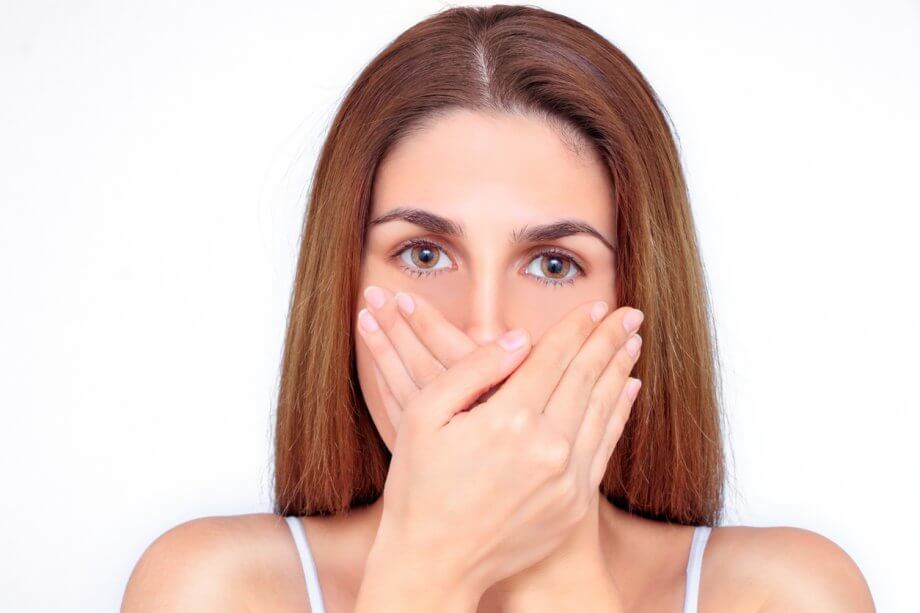If you’re human, you’ve had bad breath at some point in your life. Our patients are sometimes embarrassed to ask us about bad breath, but there’s no reason to feel that way––no one wants to have bad breath, but often the causes are out of your control. It may also be a sign of a more serious issue, which is why it’s important to take bad breath seriously and schedule a comprehensive dental exam to figure out the root cause.
Here’s what you need to know about bad breath.
Causes of Bad Breath
To know how to prevent bad breath, also known as halitosis, it’s important to understand the underlying cause. Here are the most common causes of bad breath:
Your Diet
We’d never ask you to give up garlicky hummus or everything bagels, but if you’re looking for the cause of your bad breath, it might just be in the food you eat. Garlic, raw onions, cruciferous vegetables like cabbage, curry, and other foods with strong odors can cause bad breath for up to three days. Your morning cup of coffee may also be contributing to your halitosis.
Most of us aren’t willing to forego our favorite foods and daily coffee fix, but when you’re aware that they cause bad breath, you can skip the garlic before your next important work meeting or blind date and indulge when you’re planning on spending the day at home bingeing on Netflix.
Smoking
Smoking cigarettes causes bad breath in a number of different ways. First, the smell of the cigarette smoke itself can linger on your breath. Smoking also dries out your mouth, one of the most common reasons for halitosis. Finally, smoking is one of the leading causes of gum disease, which is another source of odor from the mouth.
Gum Disease
Related to dental hygiene, plaque that is not removed from teeth turns into tartar, a sticky residue that cannot be removed by brushing. Tartar harbors bacteria, which irritates the gums; it also causes pockets, a term used for gaps that form between the teeth and gums where more tartar, plaque, food particles, and bacteria can collect. These areas, too, cannot be cleaned with brushing, so the build-up causes bad breath that worsens over time. Once pockets have formed, the only solution is a periodontal procedure called scaling and root planing. At our practice, we can perform this procedure using a laser for a more comfortable experience.
Dry Mouth
Dry mouth is a common cause of bad breath because saliva works to dilute and wash away bacteria and food particles throughout the day. When there is not enough saliva to effectively perform this function, bacteria and food become concentrated and cause odor.
Sinus and Throat Problems
Some causes of bad breath are better addressed by an ear, nose, and throat specialist or allergist rather than by a dentist. Allergies can cause mouth breathing, which in turn causes dry mouth and bad breath. Chronic sinus infections and postnasal drip both cause odor; upper and lower respiratory infections, tonsillitis, and bronchitis are also causes of halitosis. If your bad breath seems to emanate from the back of your mouth or tongue, it’s a sign that the odor is not coming from your teeth or gums.
Another reason you might have bad breath is tonsilloliths, also known as tonsil stones. Comprised of bacteria and food debris, these small calcified “stones” form in the crypts of your tonsils and can cause a foul odor that is not remedied by any of the solutions outlined below. When tonsil stones are a persistent problem, your ear, nose, and throat doctor may recommend getting your tonsils removed as a solution.
Other Health Conditions
There are other health conditions that can be a source of bad breath. These include gastroesophageal reflux disorder (GERD), kidney disease, liver disease, and diabetes. If you've tried the tips below and you haven't gotten any results and you’ve eliminated all of the potential causes listed above, it's time to make an appointment with your primary care provider for a physical.
4 Ways to Protect Against Bad Breath
Now that we’ve outlined the reasons you may have bad breath, it’s time to discuss potential solutions for it.
Prevent Dry Mouth
Dry mouth has many different causes. If you have allergies, sleep with your mouth open, or suffer from chronic sinus issues, you may breathe from your mouth instead of your nose, which causes dry mouth. Certain medications and radiation treatments also decrease the amount of saliva in your mouth. Unfortunately, many of these reasons for dry breath are not easily remedied; you can’t stop taking your medications and while sinus issues and allergies can be resolved, it’s not an overnight process.
Staying hydrated will go a long way to help with dry mouth, which in turn will improve bad breath and protect against tooth decay and gum disease. Rather than drinking soda, juice, coffee, or tea, opt for water and carry a bottle with you wherever you go. Limit the amount of alcohol you drink and switch to an alcohol-free mouthwash that has been formulated for dry mouth. When drinking water isn’t an option, choose sugar-free lozenges or gum over hard candies to keep your mouth lubricated.
Brush Two Minutes, Twice a Day
Since oral hygiene is a significant factor when it comes to bad breath, one of the first steps to take if you have halitosis is to overhaul your dental care routine. The best defense against bad breath is a good offense, which means brushing for two full minutes, twice a day, and flossing at least once a day.
You may think you’re brushing for two minutes, but if you’re not timing it, it’s likely that you’re not––two minutes is longer than most people think it is. Electric toothbrushes are fantastic because they have built-in timers, but failing that, use your phone or a kitchen timer in your bathroom to time yourself as you brush. Divide your mouth into quadrants, spending 30 seconds brushing each one. Make sure you brush the fronts, backs, and all chewing surfaces of your teeth.
Flossing should be done once a day, preferably at night to remove any stray food particles and debris that has accumulated between your teeth throughout the day. Floss gently, all the way up to the gum line, working the string back and forth as you go.
An antimicrobial mouthwash can freshen your breath too, but be sure that it’s alcohol-free. A mouth rinse made with alcohol may make your breath feel fresh and minty in the short-term, but in the long-term, it will result in a dry mouth.
Another tool to consider adding to your oral care arsenal is a tongue scraper. While the research on the value of tongue scraping is mixed (it seems to freshen breath temporarily, but the effects don’t last all day), many patients swear by them and feel that their breath is better after using a scraper. If that anecdotal evidence isn’t enough to persuade you to invest in a scraper, at the very least spend a few seconds brushing your tongue with your toothbrush after you’ve finished brushing your teeth.
If you wear a retainer, clear plastic aligners for straightening your teeth, or dentures, be sure that you clean them every day, as directed, whether it’s by brushing it with a soft-bristled toothbrush or using a specialized appliance soak. Many people have terrific oral hygiene habits, but their bad breath odor is coming from their dental appliances. Just like on your teeth, plaque and bacteria can build up on retainers, aligners, and dentures.
Quit Smoking
There are many reasons to quit smoking, and bad breath might rank lower on the list than preventing heart disease or lung cancer, but it’s still a valid reason to stop. There’s no question that smoking causes halitosis; as discussed above, the smoke itself causes odor, and it also causes both dry mouth and gum disease, two conditions that create an environment that encourages odor-causing bacteria to thrive.
Don't Skip Your Routine Dental Exams
When you’re diligent about making dental appointments every six months, we can spot potential issues before they become big problems. Tooth decay and gum disease are two root causes of bad breath; seeing your dentist regularly can prevent both of these conditions. During your biannual appointments, we also thoroughly clean your teeth, removing plaque and tartar to protect your oral health and keep your breath fresh.
Schedule an Appointment Today
Are you worried that you have bad breath? Let us help you identify the cause and find a solution. Contact us at 212-222-5225 to schedule an appointment at our Upper West Side office in New York City.

